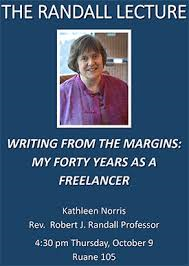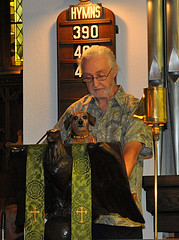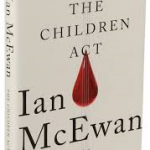 Autumn is my favorite season of the year, and October is my favorite month. This is not surprising for a native New Englander, since turning leaves together with crisp, sunny and cool days are an attractive combination. Even on this particular middle-of-October day as I write, when it is unseasonably warm and humid with a threat of heavy rain later, a few typically beautiful fall days in the past week and the promise of more to come keeps me weather-happy. I know that autumn bums many people who live where the seasons change out because it means that winter is coming. But I like winter as well, or at least the idea of it. The older I get the less I enjoy the actual fact of shoveling snow on occasion and having to warm the car up every morning, but I’ll take it over the Florida summer humidity and heat that my son and daughter-in-law profess to love for some unknown reason.
Autumn is my favorite season of the year, and October is my favorite month. This is not surprising for a native New Englander, since turning leaves together with crisp, sunny and cool days are an attractive combination. Even on this particular middle-of-October day as I write, when it is unseasonably warm and humid with a threat of heavy rain later, a few typically beautiful fall days in the past week and the promise of more to come keeps me weather-happy. I know that autumn bums many people who live where the seasons change out because it means that winter is coming. But I like winter as well, or at least the idea of it. The older I get the less I enjoy the actual fact of shoveling snow on occasion and having to warm the car up every morning, but I’ll take it over the Florida summer humidity and heat that my son and daughter-in-law profess to love for some unknown reason.
October not only means my favorite kind of weather, but also puts me in a reminiscent mood. October was an important month during my growing up years because both my mother and my brother were born in October (my mother on Halloween, which meant that we usually ignored her birthday in exchange for more interesting activities). It is my brother’s birthday in a few days; I am several months older now than the age at which my mother died. She died of cancer in October, just three weeks short of her sixtieth birthday, followed a couple of weeks later unexpectedly by the death of my father-in-law of only a few months. That was twenty-eight years ago; amazingly, sometimes it seems more like twenty-eight weeks.
October is a centrally important month every year for both students and faculty on college campuses—the first big papers and often the first significant exam of the semester (or perhaps the midterm exam) are usually October events. For students this means even more stress than usual; for faculty it means that the first few weeks of the semester that have pleasantly been free of tons of grading are now at an end. Faculty love to bitch and moan about grading—I used to be great at such complaining until Jeanne asked me once many years ago at the end of my latest grading whine-fest “Isn’t that part of your job?” Well yes, I guess it is. It’s the one part of my job that I hope I don’t have to do in my next life (because I still intend to be a college professor—there’s nothing better). Now I tend to think of October grading as a great opportunity to learn new things from my students.
are usually October events. For students this means even more stress than usual; for faculty it means that the first few weeks of the semester that have pleasantly been free of tons of grading are now at an end. Faculty love to bitch and moan about grading—I used to be great at such complaining until Jeanne asked me once many years ago at the end of my latest grading whine-fest “Isn’t that part of your job?” Well yes, I guess it is. It’s the one part of my job that I hope I don’t have to do in my next life (because I still intend to be a college professor—there’s nothing better). Now I tend to think of October grading as a great opportunity to learn new things from my students.
For instance, my colleague on an interdisciplinary faculty team informed me by email a few days ago that she just read the following in one of his freshman papers: “As Mr. Morgan talked about in lecture, during this time and culture, obeying god was the priority of every man, even if that means sacrificing your own son, which happened a lot in olden times.”  My colleague wrote “I guess I must have missed that lecture.” I responded that “Mr. Morgan is my evil twin who gives lectures on off days for students who don’t come to the regularly scheduled lectures. I take no responsibility for anything Mr. Morgan says.” In one of my own papers (the same assignment that produced my colleague’s paper) one of my freshman began as follows: “According to Google, happiness is defined as . . .” I’m glad that I’m old enough that I won’t have to fully adjust to the brave new educational world that is just around the bend.
My colleague wrote “I guess I must have missed that lecture.” I responded that “Mr. Morgan is my evil twin who gives lectures on off days for students who don’t come to the regularly scheduled lectures. I take no responsibility for anything Mr. Morgan says.” In one of my own papers (the same assignment that produced my colleague’s paper) one of my freshman began as follows: “According to Google, happiness is defined as . . .” I’m glad that I’m old enough that I won’t have to fully adjust to the brave new educational world that is just around the bend.
October also often brings important speakers to campus. Doris Kearns Goodwin, a rock star in Jeanne’s and my estimation, speaks in ten days. I remember a couple of years ago when my friend and best-selling author Kathleen Norris was resident scholar on my campus and gave a late afternoon talk. At the beginning of Q and A , Kathleen mentioned how much she used to enjoy Q and A sessions with second-graders to whom she was bringing poetry in North and South Dakota classrooms many years ago. “How old are you?” “How much do you weigh?” “Do you have a cat?” “How much money do you make?” “Do you have a bicycle?” The next time I am in attendance at a scholarly paper event, those are the questions I’m going to ask. Because those are the things I really want to know.
Even though the liturgical year is still slogging through endless weeks of “Ordinary Time,” October always brings welcome entertainment. Last Sunday we celebrated Saint Francis Sunday with “Blessing of the Animals.” I went to the early show with Frieda, who along with five other dogs held center stage and generally behaved themselves.


For several years running I was lector for Saint Francis Sunday and read the story of Balaam and his donkey from Numbers. My friend Marsue, who was rector of our little Episcopal church for those years, made sure I was scheduled as lector for this event every year because I always brought Frieda to the lectern so she could stare people down while I was reading.
During October the weekly readings are still stuck in Ordinary Time, where we have been since Pentecost. This year the readings from the Jewish scriptures have wandered through various prophets yelling at whoever would listen about various shortcomings. Last year we were walked through the familiar and fascinating stories of the patriarchs in Genesis and the dramatic escape of the children of Israel from Egyptian bondage in Exodus. In Exodus 32 Moses is up on Mount Sinai hanging out while God writes the Ten Commandments and everyone else figures he’s never coming back. So they make the Golden Calf, start a minor orgy, and you know how that worked out.  Moses is pissed; God is even more pissed. “Jesus Christ!” God yells (he forgot what part of the Bible he was in for a moment). “Moses, can you believe this shit?? I’ve had enough of these clowns! Stand back, Moses, while I wipe them all out. Then I’ll begin again with a new bunch of people starting with you, sort of like I did with Abraham in the previous book.” Moses points out that this would make God look bad, given that he put so much effort and creative thought—from plagues to parting a sea—into getting these people out of slavery, only to kill them in the desert. God’s response to Moses’ point is my favorite verse in the Jewish Scriptures, perhaps in the entire Bible: And the Lord changed His mind. The implications are unlimited.
Moses is pissed; God is even more pissed. “Jesus Christ!” God yells (he forgot what part of the Bible he was in for a moment). “Moses, can you believe this shit?? I’ve had enough of these clowns! Stand back, Moses, while I wipe them all out. Then I’ll begin again with a new bunch of people starting with you, sort of like I did with Abraham in the previous book.” Moses points out that this would make God look bad, given that he put so much effort and creative thought—from plagues to parting a sea—into getting these people out of slavery, only to kill them in the desert. God’s response to Moses’ point is my favorite verse in the Jewish Scriptures, perhaps in the entire Bible: And the Lord changed His mind. The implications are unlimited.
October also provides me with a yearly opportunity to introduce a bunch of innocent freshmen to my choice for the greatest philosopher in the Western tradition: Aristotle.  His vision of the moral life, of the life of human flourishing, is second to none. I came across a beautiful description of such a life not long ago in Ian McEwan’s The Children Act:
His vision of the moral life, of the life of human flourishing, is second to none. I came across a beautiful description of such a life not long ago in Ian McEwan’s The Children Act:
Welfare, happiness, well-being must embrace the philosophical concept of the good life. She listed some relevant ingredients, goals toward which a child might grow. Economic and moral freedom, virtue, compassion and altruism, satisfying work through engagement with demanding tasks, a flourishing network of personal relationships, earning the esteem of others, pursuing larger meanings to one’s existence, and having at the center of one’s life one or a small number of significant relations defined above all by love.
Autumn is a time when I feel, at least a little bit, that such a life might be possible. Thanks, October.











